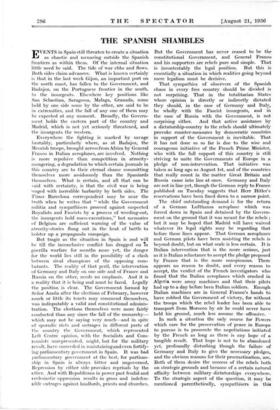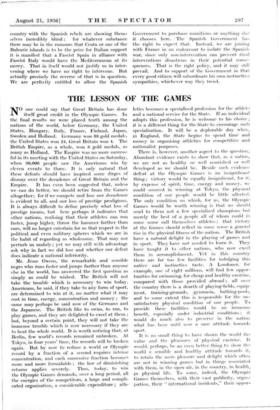THE SPANISH SHAMBLES
EVENTS in Spain still threaten to create a situation as chaotic and menacing outside the Spanish frontiers as within them. Of the internal situation little need be said. The tide of war ebbs and flows. Both sides claim advances. What is knoWn certainly is that in the last week Gijon, an important port on the north coast, has fallen to the Government, and Badajoz, on the Portuguese frontier in the south, to the insurgents. Elsewhere key positions like San Sebastian, Saragossa, 'Malaga, Granada; some held by one side some by the other, are said to be in extremities, and the fall of any one of them may be expected at any moment. Broadly, the Govern- ment holds the eastern part of the country and Madrid, which is not yet seriously threatened, and the insurgents the western.
Everywhere the fighting is marked by savage brutality, particularly where, as at Badajoz, the Moorish troops, brought across from Africa, by General Franco in Italian aeroplanes, are involved. Nothing is more repulsive than competition in atrocity-- mongering, a degradation to which certain journals in this country are to their eternal shame committing themselves more assiduously than the Spaniards themselves. What is certain, and all that can be said with certainty, is that the civil war is being waged with incredible barbarity by both sides. The Times Barcelona correspondent may be near the truth when he writes that " while the Government militia and sympathisers proceed against suspected Royalists and Fascists by a process of weeding-out, the insurgents hold mass-executions," but memories of Belgium are sufficient warning of the value of atrocity-stories flung out in the heat of battle to bolster up a propaganda campaign.
But tragic as the situation in Spain is and will be till the inconclusive conflict has dragged on in guerilla warfare for months more yet, the danger for the world lies still in the possibility of a clash between rival champions of the opposing com- batants. The reality of that peril, the intervention of Germany and Italy on one side and of France and Russia on the other, needs no emphasis. And it is a reality that it is being and must be faced. Legally the position is clear. The Government formed by Senor Azafia after the elections of February, however much or little its tenets may commend themselves, was indisputably a valid and constitutional adminis- tration. The elections themselves were more fairly conducted than any since the fall of the monarchy— which may not be saying very much—and in spite of sporadic riots and outrages in different parts of the country the Government, which represented Left Centre opinion, with the Socialists and Com- munists unrepresented, might, but for the military revolt, have succeeded in maintaining and even fortify- ing parliamentary government in Spain. It was bad parliamentary government at the best, for partisan- ship in Spain is always bitter and ungoverned. Repression by either side provokes reprisals by the other. And with Republicans in power past feudal and ecclesiastic oppression results in gross and indefen- sil?le outrages against landlords, priests and churches. But the Government has never ceased to be the constitutional Government, and General Franco and his supporters are rebels pure and simple. That is incontestably the legal position. Birk this is essentially a situation in which realities going beyond mere legalism must be decisive.
That sympathies of observers of the Spanish chaos in every free country should be divided is not surprising. That in the totalitarian States where - opinion is directly or indirectly dictated they should, in the case of Germany and Italy, be wholly with the Fascist insurgents, and iii the case of Russia with the Government, is not surprising either. And that active assistance by a dictatorship-country to the rebels should ultimately provoke counter-measures by democratic 'countries in support of the Government is inevitable. That it has not done so so far is due to the wise and courageous initiative of the French Priine who with the full support of this country is still striving to unite the Governments of Europe in a pledge of non-intervention. That initiative was taken as long ago as August 1st, and of the countries that really count in the matter Great Britain and Russia came into line at once. Germany and Italy are not in line yet, though the German reply to France published on Tuesday suggests that Herr Hitler's reservations have been fined down to a narrow point.
The chief outstanding demand is for the return of a German Lufthansa aeroplane which was forced down in Spain and detained by the Govern- ment on the ground that it was meant for the rebels ; but it may be hoped that Madrid will have waived whatever its legal rights may be regarding that before these lines appear. That German aeroplanes and German pilots have been assisting the rebels is beyond doubt, but on what scale is less certain. It is Italian intervention that is the more serious, just as it is Italian reluctance to accept the pledge proposed by France that is the more conspicuous. There appears no reason to doubt, and every reason to accept, the verdict of the French investigators who found that the Italian aeroplanes which crashed in Algeria were army machines and that their pilots had up to a day before been Italian soldiers. Enough Italian machines are in General Franco's hands to have robbed the Government of victory, for without the troops which the rebel leader has been able to transport from Morocco by air he could never have held his ground, much less assume the offensive'. , In such a situation the only course for Powers which care for the preservation of peace in Europe to pursue is to prosecute the negotiations initiated by the French as long as there is any hope of a tangible result. That hope is not to be abandoned yet, profoundly disturbing though the failure of Germany and Italy to give the necessary pledges, and the obvious reasons for their procrastination, are. Both of them desire the success of the rebels both on strategic grounds and because of a certain natural affinity. between military dictatorships everywhere. To the strategic aspect of the question, it may be mentioncd parenthetically, sympathisers in this country with the Spanish rebels are showing them- selves incredibly blind ; for whatever substance there may be in the rumours that Ceuta or one of the Balearic islands is to be the price for Italian support it is manifest that a Fascist Spain in alliance with Fascist Italy would have the Mediterranean at its mercy. That in itself would not justify us in inter- vening where we have no right to intervene. But actually precisely the reverse of that is in question. We are perfectly entitled to allow the Spanish Government to purchase munitions or anything else it chooses here. The Spanish Government has the right to o4iect that. Instead, we are joining with France in an endeavour to isolate the Spanish war, since only non-intervention can prevent rival interventions disastrous in their potential conse- quences. That is the right' policy, and it may still prevail. And to support of the Government in that every good citizen will subordinate his own instinctive sympathies, whichever way they trend.







































 Previous page
Previous page